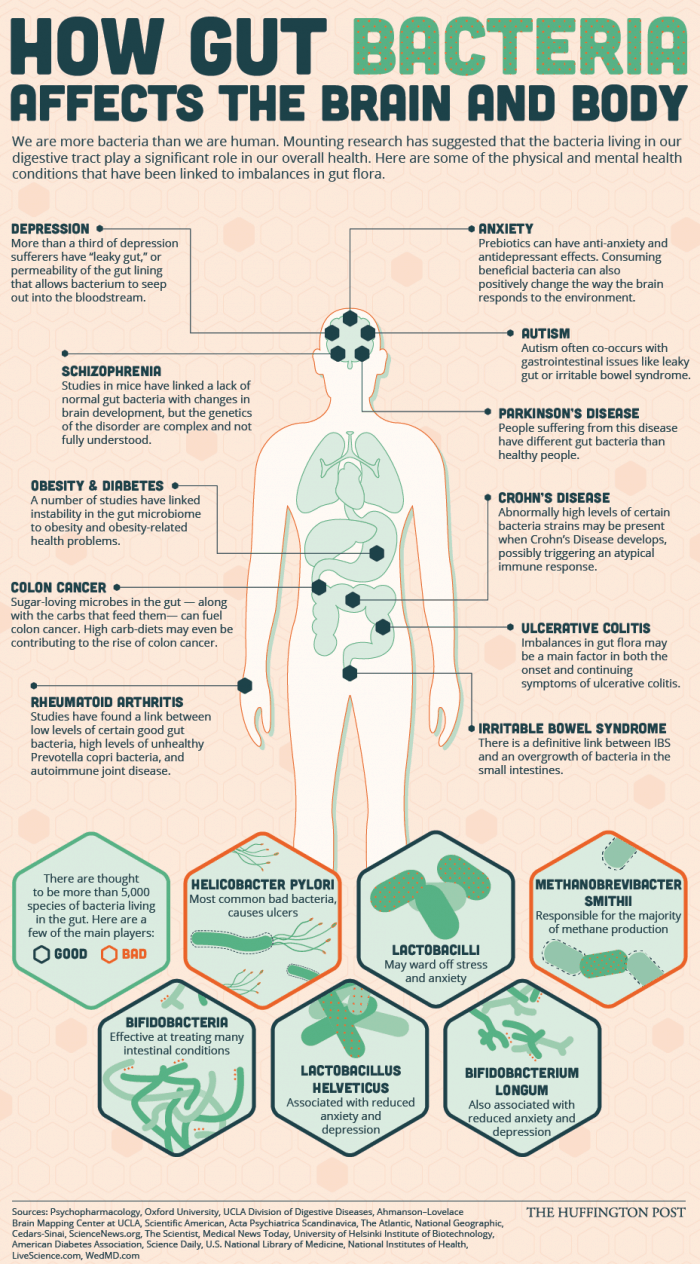Recent studies suggest bacteria in our digestive tract can play a large role in our overall health. Depression, anxiety, autism, schizophrenia, obesity, cancer and irritable bowel syndrome are just a few of the major complications gut bacteria can create.
Some even call our gut the "2nd brain" because it affects so many systems within the body.
Via Medicinenet.com:
"Research has shown that the network of neurons lining our guts is so extensive that is has now been nicknamed our "second brain" or "other brain." This gut "brain" doesn't think for us, but it does play a key role in certain diseases and communicates with the brain in our skulls.
Our "second brain" is known as the enteric nervous system. It is a collection of neurons in the gastrointestinal tract. Its role is to manage every aspect of digestion in all the organs of the gastrointestinal tract, including the esophagus, stomach, small intestine, and colon. It uses over 100 million neurons and some of the same chemicals things that can be found in your "other" brain, including neurotransmitters and neuropeptides.
Within your gastrointestinal tract, there is intestinal microflora or microbiota. This complex ecosystem contains over 400 bacterial species. Small amounts can be found in your stomach and small intestines, but the majority is found in your colon. The intestinal microflora aid in digestion, synthesize vitamins and nutrients, metabolize some medications, support the development and functioning of the gut, and enhance the immune system."
With over 5,000 species of bacteria living in the gut, we have a mix of good and bad microbes. Helicobacter Pylori causes ulcers, while Lactobacilli may ward off stress and anxiety.
Keeping a healthy digestive system is very important. Taking probiotics daily is one of the best solutions to achieve your health goals.
More than a third of depression sufferers have a "leaky gut" lining that will allow bacteria to seep into the bloodstream.
Prebiotics/Probiotics taken on a regular basis can have a anti-anxiety and antidepressant effect.
Can you believe that something this simple can make such a difference in your health and wellness? It can, if your gut flora and balance gets "off" the rest of the body will suffer.
Doctors and other healthcare providers write prescriptions so freely for antibiotics and anti-fungal medications, but fail to tell patients about the most important plan of care. Taking a probiotic or increasing the consumption of foods that contain fermented foods that are high in probiotics.
Where can I get more information on probiotics?
USProbiotics.org (http://www.usprobiotics.org/)
"Herbs and Supplements," MedlinePlus (http://www.nlm.nih.gov/medlineplus/druginfo/herb_All.html)
Wow that is impressive, imagine all the diseases and chronic health issues we could change or fix with just the balancing of a patients gut? Your gut?
I know I feel so much better since I have adjusted my diet and started taking a probiotic daily, my immune system has been stronger in the process too.
Until next time.................





I've taken probiotics for years but never knew that the bacteria in your gut can lead to depression. I have a step son with schizoaffective disorder who sadly suffers from depression and will recommend to my husband that he suggest he take them. It can't hurt right?
ReplyDeleteIt will indeed provide something more between the students to consider and produce something more within this meaning, so we would be liable to have such more ideas. psy d dissertation
ReplyDelete